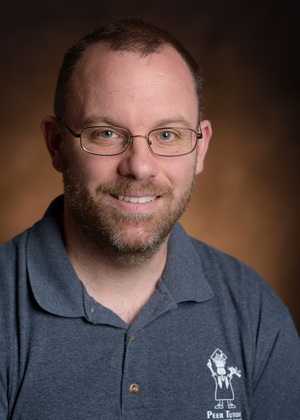Getting to Know: English and Humanities

EDITOR’S NOTE: College Relations is publishing a monthly series of news articles, features and Q&A interviews highlighting various departments on campus in an effort to assist the faculty and staff in gaining an increased awareness about and understanding of each other’s roles and responsibilities.
The April Q&A is with Dr. Lee Miller, the English and Humanities department chair.
Q: What are your duties as department chair?
My primary role is to coordinate all the activities that go into our efforts as a department. This includes maintaining our print and online materials, updating programs, scheduling our classes, meeting with potential majors, awarding scholarships, and other activities. I set the agendas for, and preside over, our meetings. I am also responsible for coordinating the implementation of our decisions.
Q: What do you like best about teaching at Chadron State?
The students, my colleagues, and the particular courses I teach. Our students are hard workers and I enjoy working with them. My colleagues challenge me intellectually and as a teacher. On top of that, I just like them as people. And I like that I get to teach a wide variety of courses rather than just the same few courses over and over.
Q: What are some of the unique aspects the English and Humanities program offers?
Our students get to work with faculty who are actively engaged in our disciplines, researching, writing, presenting, and still learning. They have the opportunity to be involved in what has historically been a very active combined club and honor society, our Sigma Beta chapter of the Sigma Tau Delta International English Honor Society. Our Honor Society students have attended and presented at the international convention and have held offices at the regional and international level. Our students can also be involved in publishing – whether submitting their own works for publication in our online and print periodical or helping in the editorial process.
Q: What characteristics unite English and Humanities?
What unites English and Humanities – and Philosophy, also in our department – is a concern for understanding what it means to be human, in particular as it relates to our use of language, art, reason, and symbols in general.
Q: What career paths do graduates of your program generally pursue?
Most go on to teach, but a few will become writers, or work in editing and publishing, or will go on to graduate school, whether in English, Legal Studies, or other fields.
Q: What student opportunities are offered in the English department?
The club/honor society and publishing opportunities mentioned above. Students can also attend the annual Story Catcher Summer Writing Workshop and Festival, usually held in early June.
Q: What advice would you share with high school students interested in English and the Humanities?
Read and write a lot. Do your own thinking. Look at things from different perspectives. Get outside yourself.
Q: How does your department provide active learning experiences for students?
Our majors have written their own creative works then they publish in a variety of environments. They have also presented critical work in a variety of settings. These works frequently begin in classes. Our education majors develop their professional voice in digital environments, have the opportunity to attend professional conferences, and actively create materials they will use as teachers.
Q: How has the 10th Street Miscellany and other creative writing endeavors been received by students?
I just learned that we have received 40 submissions for the upcoming issue, and that students are antsy to know the results. In the past, students have been proud to have their work published for others to read and enjoy.
Q: Why do you think a student should pursue a degree in English and Humanities at Chadron State?
Probably the most important reason, even for those who ultimately intend to teach, is that we offer students an opportunity to develop their abilities critically and creatively to deal in language and ideas, regardless the setting. This prepares students to teach and to write, yes, but it can also provide some foundational skills for just about any discipline or career path.
Category: Campus News, English
